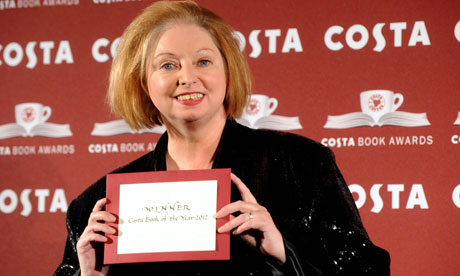Winning the Costa prize says much about our hard times, but more about British literary culture in the age of the Kindle

Hilary Mantel’s win will give the trade
much-needed commercial relief. Photograph: Stuart Wilson/Getty
Images
Hilary Mantel's success
with Bring Up the Bodies , the second volume of a projected trilogy devoted to
the life and times of Henry VIII's chancellor Thomas Cromwell, marks an
unprecedented grand slam: Booker followed by Costa, with the Women's Prize for
Fiction beckoning. It's an outcome that says a lot about the Costa prize, even
more about the hard times in which Bring Up the Bodies has been published, but
perhaps most of all about British literary culture in the age of the Kindle.
Mantel's only serious competition came from the immensely gifted Scots poet Kathleen Jamie's exciting collection, The Overhaul – a lovely, lyrical celebration of Scottishness and the Scots tongue. The judges would indeed have been bold to make that their final choice. Costa juries, traditionally, tend to take only the most gilt-edged risks.
Bring Up the Bodies is unquestionably the bookies' and the booksellers' favourite. In an exceedingly tough commercial climate, with the surge of the Kindle and ebook, Mantel's win will give the trade a much-needed moment of commercial relief. First and last, it's a recession beater.
Such a verdict would probably not be its author's ambition. Mantel has made her career with fiction and non-fiction of stunning originality. Naturally brave, she has been the opposite of predictable. This novel, however, is nothing if not reassuring. First, it takes one of medieval England's greatest thrillers (the persecution, trial and death of Anne Boleyn) and gives it a clever contemporary spin. Mixed with sharp, modern dialogue, the narrative exploits the historic present tense to give an essentially hardcore historical novel some extra literary pizzazz.
It also meets the demand for a cracking good read – the carefully-crafted entrapment of Boleyn and the alleged plotters is superbly told. Superior to Wolf Hall, its predecessor, Bring Up the Bodies will stimulate a feel-good factor throughout the nation's book groups.
Whether it will be read as anything more than a fascinating curiosity in years to come is another matter. Posterity is generally rather unkind towards crowd-pleasing prizewinners. And this is a prizewinner with knobs on.

No comments:
Post a Comment